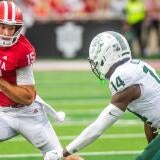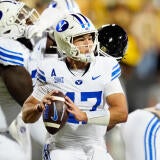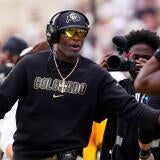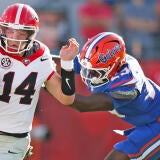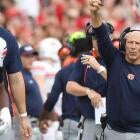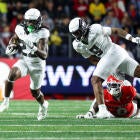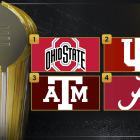
Luke Fickell gets another year, but that may be it -- Wisconsin's investment is too little, too late
The problem here is that money cannot fix everything
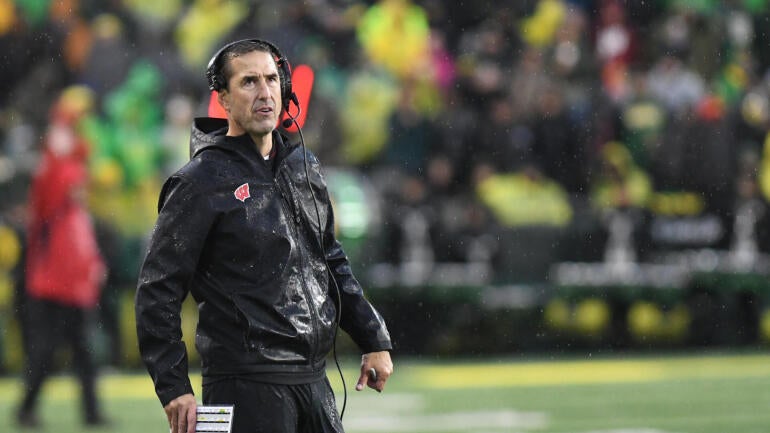
Wisconsin is kicking the can down the road.
Wisconsin AD Chris McIntosh ended all speculation Thursday, going on-record that football coach Luke Fickell would return for 2026. That was always the expectation, even if some fans hoped that a new loss every week would lead McIntosh to change his mind and become the latest athletic director to swallow a large buyout so he could go spend even more money on a new coaching staff.
Fickell's buyout was around $25 million, and anybody with an understanding of life in Madison these days understood how unlikely Wisconsin was to spend it. McIntosh indirectly told you again while discussing the future plans for Wisconsin under Fickell.
"Chancellor [Jennifer] Mnookin and I are aligned on significantly elevating investment in our program to compete at highest level," McIntosh told ESPN. "We are willing to make an investment in infrastructure and staff. As important, is our ability to retain and recruit players in a revenue share and NIL era."
Any time somebody tells you they're going to significantly elevate the investment in the program, that means there's a lot of elevating that needs to be done. Simply put, Wisconsin hasn't been playing on the same financial field as the rest of its Big Ten brethren -- it participates in the rev-sharing that gives about $13 million to its football program, but it is clear its NIL offerings are lacking. It's a huge reason why Fickell has been so unsuccessful to this point, while other Big Ten programs, which were much further behind Wisconsin with on-the-field results when Fickell was hired, have been able to take such giant leaps forward.

Indiana and Illinois have seen the investment in their football programs significantly elevated already. That investment is a big reason why (hiring the right coach is the other big one) the Hoosiers are No. 2 in the country and on the verge of a second-straight playoff appearance, while Illinois is in position to win at least nine games in consecutive seasons for the first time in program history.
As they've risen, Wisconsin has fallen. All of which seemed highly unlikely when the Fickell hire was announced. It was a move that was heralded by nearly everyone, including me, but Fickell is 14-19 at Wisconsin and 8-15 in Big Ten play.
Fickell has been foiled by a lack of resources comparatively, as well as bad luck (injuries) and bad decisions (RIP Dairy Raid experiment).
The problem with the decision to bring Fickell back in 2026 is not about Fickell himself, though. He's still the same coach who led Cincinnati to the College Football Playoff as a Group of Five school. Wisconsin's schedule, which has been one of the most difficult in the country this year, will be far easier next season (though that should not be taken as it'll be easy, because they still have to play Notre Dame to start the season).
No, the problem is money can't fix everything. At least, not the way Wisconsin needs it to. It's one thing to say you'll have an investment; it's another to actually have it. How much money will Chris McIntosh be able to raise for a program when everybody he's asking knows the situation both he and Fickell find themselves in? The simple truth is, unless Wisconsin suddenly churns out a bunch of wins next season, there's a high likelihood neither Fickell nor McIntosh sees the end of the 2026 season, let alone 2027.
It's a lot easier to ask for money when there's hope to sell.
Just look at the way one of Wisconsin's most prominent former players spoke about the program this week. On Wednesday's episode of The Pat McAfee Show, J.J. Watt didn't sound like a man who's very interested in throwing good money after bad.
Why don't you help out the Wisconsin football team 😂😂
— Pat McAfee (@PatMcAfeeShow) November 5, 2025
"We need to play better" ~ @JJWatt #PMSLive pic.twitter.com/sL7aYLSLZC
For the sake of argument, though, let's say McIntosh is able to raise a significant amount of funds this offseason. Now, Wisconsin has a bunch of money it wants to fire at the transfer portal to overhaul the roster.
Well, it's going to have to pay a premium on that talent, because like J.J. Watt, you and I know Fickell will be in one of the hottest seats in the country going into next season. So if there's a quarterback available in the portal, how much will Wisconsin have to pay to convince that player to come to Madison in that situation?

Remember, Wisconsin won't be the only Big Ten team looking for a QB in the portal this winter. Odds are, Indiana and Illinois will be sniffing around, too. Maybe Penn State's new coach brings a QB with him, or maybe the Nittany Lions are also fishing in the same waters.
Which option looks more attractive to you? An Indiana team coming off two playoff appearances, or a Wisconsin team where the coach you're signing up to play for could be fired by mid-October?
The simple truth is, if Wisconsin had the kind of money available to pull off a Texas Tech and overhaul the program in one offseason, it would've paid the $25 million buyout to start over. But it doesn't, so it didn't.
Wisconsin may be serious about putting more money into its football program, but it's far more likely to be another coach who reaps the benefits of that money than Luke Fickell.


